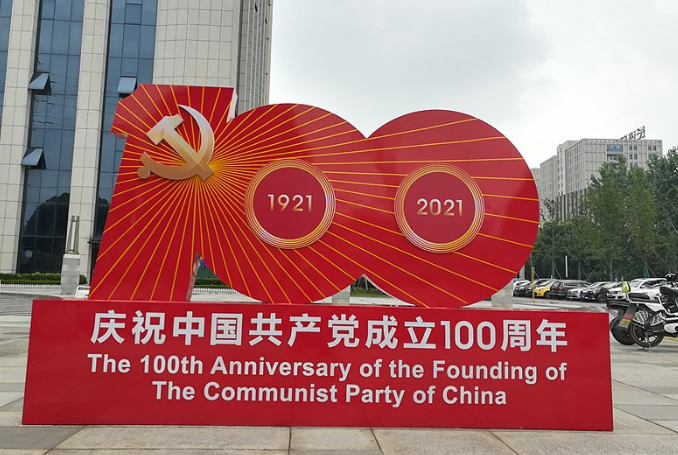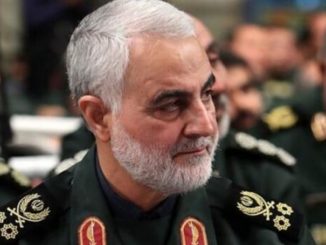
By Ramzy Baroud 
An article by Gideon Rachman in the Financial Times last July is a prime example of western intelligentsia’s limited understanding of China’s unhindered rise as a superpower. “Becoming a superpower is a complicated business. It poses a series of connected questions about capabilities, intentions and will,” Rachman wrote.
To help us understand what this claim precisely means, the FT writer uses an analogy. “To use a sporting analogy, you can be an extremely gifted tennis player and genuinely want to be world champion, but still be unwilling to make the sacrifices to turn the dream into reality.”
At least, in Rachman’s thinking, China is capable of being a political actor, though it remains incapable of vying for the superpower status, as it supposedly lacks ‘the will’ to make the required ‘sacrifices’.
Although I visited Beijing only once, a few years ago, I, or even any casual visitor to the Chinese capital, could attest to the powerful collective economic engine that fuels not only China but much of the world economy. While Chinese officials do not outright profess that their ultimate aim is to make their country a superpower – for, frankly, rarely are superpowers aware of the mechanisms that lead to such status – the Chinese leadership fully fathoms the nature of the challenge at hand.
Take Chinese President Xi Jinping’s speech in October 2019, on the occasion of the 70th anniversary of the founding of the Republic of China. “Over the past 70 years, under the strong leadership of the Communist Party of China (CPC), the Chinese people, with great courage and relentless exploration, have successfully opened the path of socialism with Chinese characteristics. Along this path, we have ushered in a new era,” he said. Note Xi’s constant references to ideology, nationalism, forward-thinking and insistence on China’s central position in this ‘new era’. Xi was elevated to the status of Mao Zedong – as a ‘core leader’ in 2019 and ‘helmsman’ in 2021 – precisely due to his role in transitioning China in terms of power, politics and global prestige.
Indeed, the sooner we acknowledge that China is an influential political entity that operates according to a clear and decisive political strategy, the more meaningful our understanding of the geopolitical transformation in Asia, and the rest of the world, will be.
Since the rise of Britain as a colonial power, thus the advent of a new world order, determined almost exclusively by western powers, the global center of power, starting in the 18th century, had shifted away from Asia and the Middle East.
Later on, starting in the mid-twentieth century, the main competition that colonial western powers had been forced to contend with came from the Soviet Union, its Warsaw Pact, and their international allies, mainly Europe’s former colonies in the Southern hemisphere.
The collapse of the Soviet Union, starting in 1989, ushered in the return of western control, this time led by the United States as the world’s only hegemon and neocolonial master.
It quickly became obvious, however, that the post-Soviet global paradigm was unsustainable, as Europe’s economic influence was rapidly shrinking and Washington’s desperate attempt at policing the world was failing due, in part, to its own miscalculations but also to the stiff resistance it faced in its new colonial domains, mostly in Iraq and Afghanistan.
The cost of war, aside from its incalculable massive destruction and human toll – according to a very modest estimate, almost one million people were killed in US military adventures since 2001 – has also come at a great cost to the already weakening US economy. Brown University’s Costs of War Project, published in September 2021, has calculated that the US has spent up to $5.8 trillion in its failed military operations in Afghanistan and Iraq since 2001. The same report has also estimated that an additional $2.2 trillion will be spent over the next 20 years in health care and disability coverage for veterans.
The US involvement in long wars with undefined objectives opened up unprecedented geopolitical spaces that Washington and its western allies have dominated over the course of decades. For example, the US had near-total geopolitical control over much of South America starting with the introduction of the Monroe Doctrine, in 1823. The same assertion can be made about Africa which, despite the formal end of colonialism in the long-exploited continent, continued to revolve around the same western colonial powers of yesteryears. However, a noticeable shift in the West’s geostrategic influence in these regions began taking place in the last three decades.
While the West was fighting essentially futile wars in Afghanistan and Iraq as part of the intentionally ill-defined ‘war on terror’, regional and international political actors moved in to fill the gaps created by American and western absence from their various regions of influence. Russia has speedily offered itself as a military and strategic ally and alternative to the US in parts of the Middle East, Africa and South America – in Syria, Libya and Venezuela respectively – as China moved in to fulfill a much larger economic role, branding itself as a fair partner, especially if compared to western powers.
It was not until the gradual US retreat from Iraq in 2011 that Washington announced its ‘Pivot to Asia’, a new military and political stratagem aimed at offsetting the Chinese influence in the Asian Pacific region. Much of former US President Barack Obama’s first term in office was dedicated to America’s political strategic realignments in the Asia Pacific.
“The United States is a Pacific power, and we are here to stay,” Obama declared in a speech to the Australian parliament in November 2011. “As we end today’s wars, I have directed my national security team to make our presence and missions in the Asia-Pacific a top priority.”
However, the American geopolitical shift may have arrived belatedly. For one, the repercussions of America’s military undertakings in Central Asia and the Middle East – as time has clearly demonstrated – were far too severe and costly to be simply canceled out by a declaration of a new strategy. Two, China had, by then, built a complex network of alliances in Asia and around the world, allowing it to cement real bonds with many nations, especially those concerned or fed up with the West’s obsession with military superiority and interventions.
According to a report published in October by the International Institute for Sustainable Development, over the last twelve years, China has been Africa’s largest trading partner. “China has created 25 economic and trade cooperation zones in 16 African countries,” the report reads, “and has continued to invest heavily across the continent throughout the COVID-19 pandemic, according to a government report about Chinese–African economic and trade ties.”
In contrast, according to data published by Statista Research Department in August, “after a peak in 2014, foreign direct investment (FDI) in Africa from the United States dropped to 47.5 billion U.S. dollars (from 69.03) in 2020.”
Here is precisely where many analysts go wrong, arguing, as Rachman did, that “China’s economic weight, as the world’s largest trading power and manufacturer, gives it significant political leverage internationally. […] But Beijing’s economic power is not always politically decisive”.
This limited thinking is based on the assumption that, to be ‘political’ is to follow the same blueprint used by the US and its western partners in their approach to foreign policy, diplomacy and occasional wars. China’s take on politics, however, has always been quite different. According to Beijing’s thinking, China does not need to invade countries to earn the designation of a political actor. Instead, China is simply tapping into its own historical trajectory of utilizing economic influence in its quest for greatness, and arguably, empire. The fact that the Road and Belt Initiative – a long-term strategy aimed at connecting Asia with Africa and Europe via land and maritime networks – is a modern interpretation of the Silk Road, which was a network of ancient trade routes which linked China to the Mediterranean region, is enough to tell us about the nature of the Chinese model.
That in mind, China has also taken many steps that are unmistakably ‘political’ even from the selective definition of western intelligentsia. One of the many treaties that China has initiated, co-founded or joined is the Shanghai Cooperation Organization, which, as of September, included Iran as well. The Shanghai Pact is a Eurasian political, economic, and security alliance that was established in 2001 and has served to counterbalance western, US-led transnational organizations.
Until the last decade, Beijing had resorted to economic cooperation as the most productive way of facilitating its arrival to the global stage as a potential or a fledgling superpower. However, one may argue that, not until Obama’s ‘Pivot to Asia’, Donald Trump’s trade war, and Joe Biden’s incessant threats to China over Taiwan, did Beijing begin accelerating the political dimension of its strategy. China’s so-called ‘wolf diplomacy’ is one of Beijing’s most trusted tactics through which clear and repeated messages are sent to Washington and its allies, that the rising East Asian nation will not be kowtowed or intimidated. The “wolf warrior diplomacy” describes a more assertive and even confrontational style employed by Chinese diplomats to defend China’s national interests.
According to the common western understanding, China, or any other country for that matter, that dares operate outside the dictates of western agenda, is a threat or a potential threat. However, even when China’s economic fortunes were rising, following Deng Xiaoping’s successful economic reforms campaign in 1978, the country was not seen as a ‘threat’ per se, as Beijing’s economic rise fueled Asia and, by extension, the global economy, eventually even mitigating the Great Recession of 2008, which itself resulted from the collapse of US and European markets. China only became a threat when it dared define its geopolitical objectives in the Asia Pacific region, starting in the South and East China Seas.
Not only is China very much a political actor but one would contend that presently, it is the most important political actor in the world, as it gradually but surely challenges American and western dominance on various fronts – military in Asia, economically and politically elsewhere. China’s influence can also be observed beyond Asia and Africa, in Europe itself, as even Washington’s own allies are openly divided in their approach to the brewing US-China cold war and America’s insistence on repelling the encroaching Chinese danger.
“A situation to join all together against China, this is a scenario of the highest possible conflictuality. This one, for me, is counter-productive,” French President Emmanuel Macron said during a discussion broadcast by Washington-based think tank, the Atlantic Council, in February.
It behooves us all to abandon the notion that China is only interested in business and nothing else. This stifling thinking regarding China helps perpetuate the notion that the US has used its global dominance to achieve other noble objectives, for example, ‘restoring’ democracy and defending human rights. Not only are the degradation of China and the elevation of the US essentially racist, but also entirely untrue.
(This article was originally published in Politics Today)
(Romana Rubeo, an Italy-based journalist and editor, contributed to this article.)

– Ramzy Baroud is a journalist and the Editor of The Palestine Chronicle. He is the author of six books. His latest book, co-edited with Ilan Pappé, is “Our Vision for Liberation: Engaged Palestinian Leaders and Intellectuals Speak out”. Dr. Baroud is a Non-resident Senior Research Fellow at the Center for Islam and Global Affairs (CIGA). His website is www.ramzybaroud.net







